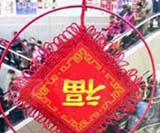 The approaching Spring Festival brings a wind-fall to Chinese folk product manufacturers and dealers with sales of many traditional items; the most popular being red paper banners marked with a big golden Chinese character, fu - meaning good luck.
The approaching Spring Festival brings a wind-fall to Chinese folk product manufacturers and dealers with sales of many traditional items; the most popular being red paper banners marked with a big golden Chinese character, fu - meaning good luck.
People in big cities like Shanghai have gradually given up the old tradition of decorating their doorways with elaborate ceremonial posters during the Spring Festival. Many simply choose to paste this red banner on their doorways hoping that it will be enough to deliver their New Year's wishes.
When pasting the red paper on the door, the character fu must be arranged in an upside-down position. In this position, the character has the same pronunciation as "arrival", which signifies that good luck will come in through the door in the New Year.
Over the past 5,000 years, imaginative Chinese culture has developed many traditions relating to doors, although with the passing of time not all are strictly observed. These traditions, superstitious to some degree, have their roots in ancient Chinese culture.
The door as the entrance and exit of a building has a potent symbolic value. It stands as a borderline between the outside world and the home, warmth and coldness, as well as danger and safety. Such important functions coupled with people's rich imaginations gave the doorway a certain mystery, which led to the concept of Door Gods.
The earliest Door Gods were Shen Tu and Yu Lei, two figures who could drive ghosts away according to ancient legends. Their names or pictures were depicted in peach wood hangings that hung along the two sides of a door or gate.
The rich red color of peach wood made it the choice for this sentry function, as its color was believed to drive off ferocious animals that came to attack people during the winter months. Later with the development of paper, red banners replaced the peach wood.
Unlike other gods who remain constant, there have been many different Door Gods throughout Chinese history. Although they may differ in certain features, all share the characteristics of strength and bravery - features important to protect the family from ghosts and animals.
The earlier Door Gods were depicted with fearful facial features and expressions. Later, people used the images of famous former generals in their images of Door Gods. There was once a joke saying that China's famous generals had all been reduced to doorkeepers for ordinary people.
As society developed, people became less fearful of their living environment and shifted their attention to life quality. Some families began to add wishes to the pictures pasted on the door.
For example, there are pictures of Door Gods pointing to images of bats - in Chinese, the pronunciation of bat is the same as that of luck - to indicate the coming of good luck.
However, using pictures to express wishes has been limited. People began to put red scrolls with antithetical couplets on their doors. In this way, their wishes for the New Year could be fully expressed in the two lines.
The tradition of pasting couplets on the door is still observed in many places of China. These flourishing red couplets on the doors add much jubilance to the festival season.
(People?s Daily February 06, 2002)
